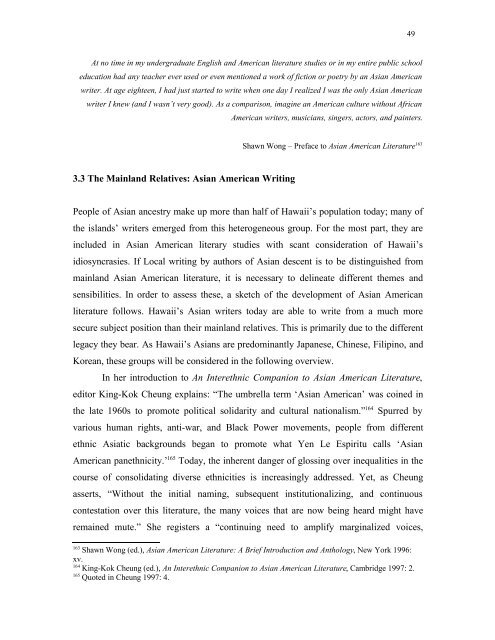A Paradise Lost - KOPS - Universität Konstanz
A Paradise Lost - KOPS - Universität Konstanz
A Paradise Lost - KOPS - Universität Konstanz
Create successful ePaper yourself
Turn your PDF publications into a flip-book with our unique Google optimized e-Paper software.
At no time in my undergraduate English and American literature studies or in my entire public school<br />
education had any teacher ever used or even mentioned a work of fiction or poetry by an Asian American<br />
writer. At age eighteen, I had just started to write when one day I realized I was the only Asian American<br />
writer I knew (and I wasn’t very good). As a comparison, imagine an American culture without African<br />
3.3 The Mainland Relatives: Asian American Writing<br />
American writers, musicians, singers, actors, and painters.<br />
Shawn Wong – Preface to Asian American Literature 163<br />
People of Asian ancestry make up more than half of Hawaii’s population today; many of<br />
the islands’ writers emerged from this heterogeneous group. For the most part, they are<br />
included in Asian American literary studies with scant consideration of Hawaii’s<br />
idiosyncrasies. If Local writing by authors of Asian descent is to be distinguished from<br />
mainland Asian American literature, it is necessary to delineate different themes and<br />
sensibilities. In order to assess these, a sketch of the development of Asian American<br />
literature follows. Hawaii’s Asian writers today are able to write from a much more<br />
secure subject position than their mainland relatives. This is primarily due to the different<br />
legacy they bear. As Hawaii’s Asians are predominantly Japanese, Chinese, Filipino, and<br />
Korean, these groups will be considered in the following overview.<br />
In her introduction to An Interethnic Companion to Asian American Literature,<br />
editor King-Kok Cheung explains: “The umbrella term ‘Asian American’ was coined in<br />
the late 1960s to promote political solidarity and cultural nationalism.” 164 Spurred by<br />
various human rights, anti-war, and Black Power movements, people from different<br />
ethnic Asiatic backgrounds began to promote what Yen Le Espiritu calls ‘Asian<br />
American panethnicity.’ 165 Today, the inherent danger of glossing over inequalities in the<br />
course of consolidating diverse ethnicities is increasingly addressed. Yet, as Cheung<br />
asserts, “Without the initial naming, subsequent institutionalizing, and continuous<br />
contestation over this literature, the many voices that are now being heard might have<br />
remained mute.” She registers a “continuing need to amplify marginalized voices,<br />
163 Shawn Wong (ed.), Asian American Literature: A Brief Introduction and Anthology, New York 1996:<br />
xv.<br />
164 King-Kok Cheung (ed.), An Interethnic Companion to Asian American Literature, Cambridge 1997: 2.<br />
165 Quoted in Cheung 1997: 4.<br />
49

















